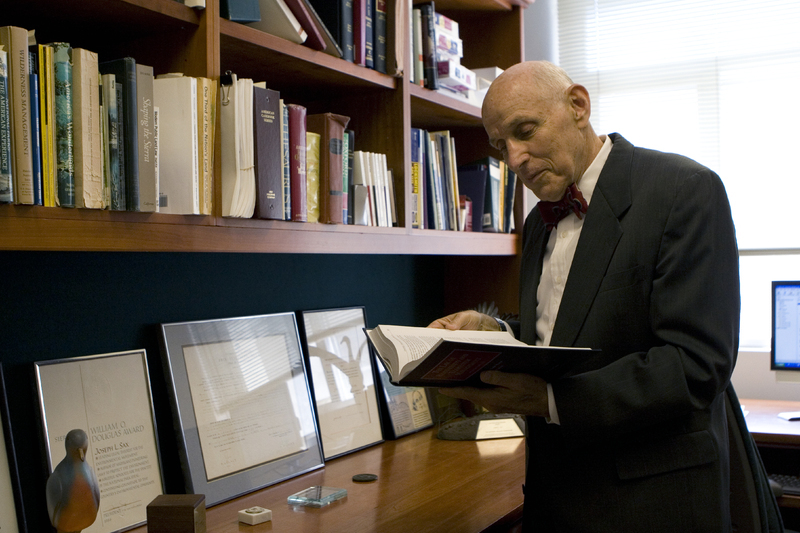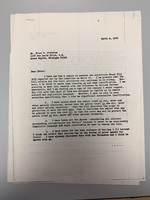Joseph Sax
"I think Joe, more than anybody else, is responsible for the very existence of the field called environmental law. Joe came up with some of the central concepts that are still key to environmental law." - Professor Barton 'Buzz' Thompson, Standford Law School
Born and raised in Chicago in 1936, Joseph Sax attended Harvard University, graduating in 1957 before returning to Chicago and receiving a law degree from the University of Chicago in 1959. Sax began his teaching career at the University of Colorado in Boulder in 1962, where he taught courses focused on natural resources.
In 1966, he began working at the University of Michigan Law School, partly due to the outstanding reputation of the School of Natural Resources, and he would stay there for almost 20 years. During this time, Sax began to focus his work on the public trust doctrine, which states that natural resources are a public trust that requires protection and preservation against private intrusion.
Around this time, in 1969, Sax was approched by Joan Wolfe, the chairman of the West Michigan Environmental Action Council (WMEAC), inquiring whether he would be interested in writing a draft environmental protection law that the council could submit to the Michigan State legislature. In exchange for his work, Sax recieved compensation from the WMEAC to support his labor and the supplies needed. The draft proposal was finished quickly and submitted in the 1969 legislature session by the council with the designator H.B. 3055, although nothing was done with it that year, and discussion carried over into the 1970 session.
The bill proposed a new law that would protect the air, water, and other natural resources from pollution, impairment, and destruction by allowing a number of parties, including the attorney general, cities or towns, and any citizen of Michigan, to sue another entity that they could prove was jeopardizing or harming the natural environment of the state.
Since it's passing, the Michigan Environmental Protection Act has been used as a model for similar legislation in over a dozen other states and has influenced the creation of international environmental law.
H.B. 3055 suffered some revisioning on its way through the legislature, and much debate among legislators, but was successfully passed and the Michigan Environmental Protection Act, or M.E.P.A., was signed into law by Governor Milliken on July 27, 1970 with most of its basic provisions intact. Public hearings played a large role in the bill's passing. One such event occured in Lansing in Janueary of 1970, during which 31 people testified, including representatives of a number of Michigan environmental organizations, Joan Wolfe, and Sax himself, who gave what Representative Thomas Anderson described as a 'complete explaination of the bill', summarizing the legislation and rationale. Although Sax had only originally been commissioned to write the draft proposal, he remained active throughout it's time in the legislature, commenting and critiquing ammendments and substitutions and lobbying for support, as well as after it passed, when he continued to defend it.
One such example of this came during the Pigeon River Country National State controversy. In the 1970s, after the passing of the M.E.P.A., a fierce debate was waged between environmentalists and the oil industry over the possibilty of drilling for oil in the Pigeon River Country National Forest, an area rich with natural resources, including the only herd of elk east of the Mississippi River. In an effort to protect the environment there, as well as the integrity of M.E.P.A., Sax and like-minded environmentalists, used the law to push back against the drilling and the government's approval of it, an act to increase revenue that would have undercut the basis of M.E.P.A. to the point of it being obsolute. Due to the hard work of Sax and his colleagues, this was not the case.
After leaving the U-M Law School in the 1980s, Sax began teaching at the University of California, Berkeley School of Law until 2010. In addition, he was a counselor in the Clinton Administration from 1994 to 1996.
"In his lifetime, Joe had an immeasurable influence on the field on environmental law, his colleagues, and generations of students," - Acting Dean Gillian Lester, Berkeley Law
Joseph L. Sax passed away in 2014 at 78 years of age.
Throughout his lifetime, Sax authored five books and received numerous honors, including the U.S. Environmental Protection Agency's Environmental Award, the Audubon Society's Conservationist of the Year Award, the Sierra Club's William O. Douglas Legal Achievement Award, and the prestigious international Blue Planet Prize in 2007. He was a visiting professor for a number of institutions in the US and abroad and in addition, he served as a consultant or board member of nineteen environmental public service organizations.




